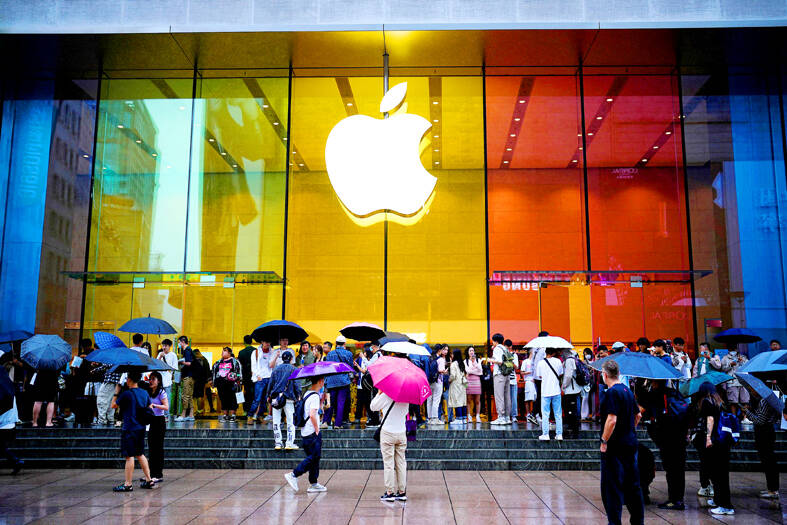Chinese state-backed experts have found a way to identify people who use Apple’s encrypted AirDrop messaging service, according to the Beijing municipal government.
AirDrop allows users to send content to Apple devices in close proximity without an Internet connection, encoded so they cannot be viewed by other people.
The service was widely used by participants in pro-democracy protests in Hong Kong in 2019 that China’s central government eventually quelled.

Photo: Reuters
Apple also limited file-sharing for Chinese iPhone users in 2022 following protests against the ruling Communist Party’s stringent zero COVID policy.
The Beijing municipal government’s justice bureau said experts at the Beijing Wangshen Dongjian Justice Appraisal Institute in the capital had devised a way to reveal an iPhone’s encrypted device log.
From there, they could identify an AirDrop user’s phone number and e-mail accounts, the statement on the bureau’s Web site said.
It said the technique “cracked the tough technological problem of the transmission of inappropriate information with anonymous traceability via AirDrop.”
The method also “raised the efficacy and accuracy of case detection and resolution, and has effectively helped police ascertain several case suspects.”
The statement did not mention whether the technique had led to any arrests or convictions.
Apple did not immediately respond to a request for comment from AFP.
There were widespread reports in late 2022 that people in China were using AirDrop to spread digital leaflets critical of the government.
The transmissions were believed to be partly inspired by a protest in Beijing in which a man hung banners calling for the removal of President Xi Jinping (習近平).
In November of that year, Apple released an AirDrop update that meant users of Apple smartphones in China could only opt-in to receive files from unknown contacts during a 10-minute window before it automatically shuts off. The feature did not previously have a time limit.
The update made it virtually impossible to receive unexpected files from strangers.
Chinese authorities have for years used extensive digital surveillance methods to silence dissent, with most domestic social media apps requiring users to register using their real names.
People must provide proof of identification to purchase SIM cards or install home broadband connections.
Platforms such as Weibo (微博) employ thousands of content moderators and automatically block politically sensitive keywords, such as tennis star Peng Shuai’s (彭帥) name after she accused a senior politician of sexual assault in 2021.
Apple has long faced criticism for making perceived concessions to Xi’s increasingly repressive China.
The company in 2019 removed a Hong Kong map application used by pro-democracy protesters, saying it endangered police, after China warned the tech giant to drop the app.
Apple CEO Tim Cook defended the move at the time, saying the firm had received “credible information” that the app was being used to target individual police officers.
In 2020, Beijing imposed a sweeping national security law on Hong Kong that has all but quashed public dissent in the former British colony.

Intel Corp chief executive officer Lip-Bu Tan (陳立武) is expected to meet with Taiwanese suppliers next month in conjunction with the opening of the Computex Taipei trade show, supply chain sources said on Monday. The visit, the first for Tan to Taiwan since assuming his new post last month, would be aimed at enhancing Intel’s ties with suppliers in Taiwan as he attempts to help turn around the struggling US chipmaker, the sources said. Tan is to hold a banquet to celebrate Intel’s 40-year presence in Taiwan before Computex opens on May 20 and invite dozens of Taiwanese suppliers to exchange views

Application-specific integrated circuit designer Faraday Technology Corp (智原) yesterday said that although revenue this quarter would decline 30 percent from last quarter, it retained its full-year forecast of revenue growth of 100 percent. The company attributed the quarterly drop to a slowdown in customers’ production of chips using Faraday’s advanced packaging technology. The company is still confident about its revenue growth this year, given its strong “design-win” — or the projects it won to help customers design their chips, Faraday president Steve Wang (王國雍) told an online earnings conference. “The design-win this year is better than we expected. We believe we will win

Chizuko Kimura has become the first female sushi chef in the world to win a Michelin star, fulfilling a promise she made to her dying husband to continue his legacy. The 54-year-old Japanese chef regained the Michelin star her late husband, Shunei Kimura, won three years ago for their Sushi Shunei restaurant in Paris. For Shunei Kimura, the star was a dream come true. However, the joy was short-lived. He died from cancer just three months later in June 2022. He was 65. The following year, the restaurant in the heart of Montmartre lost its star rating. Chizuko Kimura insisted that the new star is still down

While China’s leaders use their economic and political might to fight US President Donald Trump’s trade war “to the end,” its army of social media soldiers are embarking on a more humorous campaign online. Trump’s tariff blitz has seen Washington and Beijing impose eye-watering duties on imports from the other, fanning a standoff between the economic superpowers that has sparked global recession fears and sent markets into a tailspin. Trump says his policy is a response to years of being “ripped off” by other countries and aims to bring manufacturing to the US, forcing companies to employ US workers. However, China’s online warriors